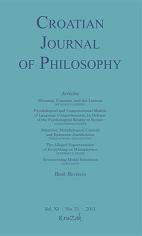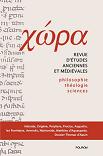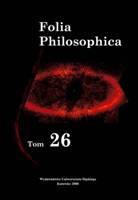
We kindly inform you that, as long as the subject affiliation of our 300.000+ articles is in progress, you might get unsufficient or no results on your third level or second level search. In this case, please broaden your search criteria.


In this paper, I argue for a modified version of what Devitt (2006) calls the Representational Thesis (RT). According to RT, syntactic rules or principles are psychologically real, in the sense that they are represented in the mind/brain of every linguistically competent speaker/hearer. I present a range of behavioral and neurophysiological evidence for the claim that the human sentence processing mechanism constructs mental representations of the syntactic properties of linguistic stimuli. I then survey a range of psychologically plausible computational models of comprehension and show that they are all committed to RT. I go on to sketch a framework for thinking about the nature of the representations involved in sentence processing. My claim is that these are best characterized not as propositional attitudes but, rather, as subpersonal states. Moreover, the representational properties of these states are determined by their functional role, not solely by their causal or nomological relations to mind-independent objects and properties. Finally, I distinguish between explicit and implicit representations and argue, contra Devitt (2006), that the latter can be drawn on “as data” by the algorithms that constitute our sentence processing routines. I conclude that Devitt’s skepticism concerning the psychological reality of grammars cannot be sustained.
More...

In the formation of epistemically justified beliefs, what is the role of attention, and what is the role (if any) of non-attentional aspects of cognition? We will here argue that there is an essential role for certain non-attentional aspects. These involve epistemically relevant background information that is implicit in the standing structure of an epistemic agent’s cognitive architecture and that does not get explicitly represented during belief-forming cognitive processing. Since such “morphological content” (as we call it) does not become explicit during belief formation, it cannot be information that is within the scope of attention. Nevertheless, it does exert a subtle influence on the character of conscious experience, rather than operating in a purely unconscious way.
More...
Here is a view at least much like Lewis’s “Humean supervenience,” and in any case highly influential—in that some endorse it, and many more worry that it is true. All truths about the world are fixed by the pattern of instantiation, by individual points in space-time, of the “perfectly natural properties” posited by end-of-inquiry physics. In part, this view denies independent variability: the world could not have been different from how it actually is, in the ways depicted by common sense and the special sciences, without differing in the punctiform instantiation of fundamental physical properties. In part, it makes an ontological claim: what it is for one of the objects recognized by common sense or special sciences to be there in the world, bearing the properties attributed by a true description, is “nothing over and above” the obtaining of fundamental physical properties at points, and fundamental physical relations among points. I argue that this view is untenable. I concede that for every true claim in familiar discourses, there is a state of affairs at the level of fundamental microphysics that is the truth-maker—some state of affairs sufficient for truth in the familiar claim. The problem is that the view needs to posit not just truth-makers at the level of microphysics, but truth-conditions—states of affairs the obtaining of which is required for truth in any familiar claim, and the failure of which renders the familiar claim false. That is, the view must posit necessary conditions, at the level of microparticles, for truth in familiar claims. This it cannot plausibly do.
More...
L'intervention reprend les résultats de la recherche contemporaine sur Plotin. Sourtout sur l'attention aux rapports entre l'Un et l' l'Être. En partant en effet de l'identité ou de l'originaire distinction d'Un et Être il est possible retrouver une série d'influences des problématiques plotinian sur la pensée contemporaine qu'elles trouvent en Shelling, Hegel et Heidegger des interlocuteurs privilégiés. D'autre part, en suivant cette position critique, il y a une considérable fécondité de Plotin même en penseurs que, loins de sa impostation, déterminent autonomement des considerations critiques qui sont très voisins à cette costruction intellectuel. Telle position commence à fournir quelque intéressant approfondissement dans la pensée de Leibnitz mais même les lectures de la Critique de la Raison Pure de Kant, surtout ces de Luigi Scaravelli, peuvent être étudiées à la lumière des difficultés élaborées sur la pensée de Plotin.
More...

In this article, I discuss Plotinus' critique of the peripatetic idea of the divine intellect as first principle. As I am trying to show, Plotinus accepts the unity of the intellect as self-thinking, and, even more than Aristotle, he emphasizes this unity. Yet, he insists on the necessity of a principle that is even higher and simpler than the intellect. Eventually, intellect proves to be the unity of a plurality, though it is the most unitary being. I discuss the dual nature of the intellect: both as thinking and as being, intellect is both unitary and plural. Starting from this, I analyze Plotinus' arguments of the absolute one as first principle, above intellect.
More...

The author investigates the number and its nature in Plotinus' works trying to solve the following question: what number is considered intelligible - the number in general or the number in particular? Three answers are given over this study. Thus, if the number is generally defined as intelligible (as Plotinus sometimes does), than the number in general is an intelligible reality (a general intelligible number, therefore, exists). On the other hand, if we make a distinction between numbers (the plural) and number (the singular), it seems that, for Plotinus, only the particular number could be considered clearly intelligible, while the number as a generic reality is not so. Actually, the final solution comes out from the agreement between these two divergent theses. This agreement is based on the idea of the total number: a number that is in the same time particular and general, a number who is the object of the final part of the present study.
More...
L'article compare le motif de la contemplation de son propre image dans une surface reflétante chez Plotin avec des motifs semblables que l'on trouve non seulement dans les récits mythologiques, mais aussi dans les doctrines cosmologiques des systèmes philosophiques à la fois proches et concurrents à Plotin, gnostiques surtout. En même temps il veut souligner, en analysant deux metaphores mythologiques, dont une se sert du motif de la réflexion dans le mirroir (le mythe orphique du démembrement de Dionyse) et l'autre dans l'eau (le mythe de Narcisse), les différences qui séparent la doctrine plotinienne de la descente de l'âme et celle de sa chûte.
More...
Plotinus represent a constant reference in all of Šestov's philosophy. For the Russian philosopher Plotinus is, on the one hand, the one who thought up the synthesis of Greek philosophy, on the other, the one who first broke with that same tradition precisely when it was at its peak. However, Šestov does lift from the Enneads certain passages which he marries - as if in a sort of contrapuntal rewriting exercise - to others in which Plotinus seems to contradict himself. What interests Šestov are precisely those discontinuities in the thought of the last great philosopher of old in an anti-Greek function. That of Šestov is once again a marked criticism of Rationalism as creator of an autonomous set of ethics that he judges according to an intellect which everything is subject to. Autonomous ethics affirms Šestov, is a fruit of Greek schools of thought to the extent that it shows distrust for what is mutable, unforeseen and arbitrary, of everything which, in short, is irrational, as it is not inserted in the One/All necessitating, justifying, regulating. In the alternative between Athens end Jerusalem, between the Rationalism and the bible, Šestov opts to assume a stance, in no uncertain terms, on the side Jerusalem, taking with him the Plotinus af the awakening and heading towards a greater reality capable of overturning the throne occupied for too long by reason. That Plotinus who at a certain point was obliged to say that in this other dimension 'the intellect before God represents a reckless, ungodly apostate' (VI.9.5). That Plotinus, who ultimately, in one of those most particular moments, realized that he was predestined for something loftier with respect to the world of evil and death.
More...
The religious spirit in Plotinus. Lots of studies from last 30 years have shown similar attitudes and spiritual tendencies in early christian and neoplatonic teachings. But we could not forget that we are dealing here with two major rivals on the intellectual scene of Late Antiquity. Despite commun aspects in plotinian and gnostic doctrines, there are some strong critics in Plotinus works, most of them in Enneads II,9, that let no doubt of the distance between the gnostic and neoplatonic positions on some key issues. This article points out four aspects of the plotinian doctrine that clearly break up with some of the main christian religious attitudes. Plotinus had a positive jugement on the sensible world, he had never expressed contempt towards nature, refused any presomption on religious metters and considered the philosophy as the only way to mistical union with the One.
More...
Iamblichus has long lived under the shadow of Plotinus. One can easily recognize this from the historiography of the Neoplatonic School starting, for example, with J. J. Brucker's Historia critica philosophiae (1742) and continuing with Hegel and 19th century historians like Simon and Vacherot in France, Kroll and Zeller in Germany. But from Praechter on Iamblichus was acknowledged more and more as an original thinker and the real systematiser of the late Neoplatonic School. We can see more clearly now that the inclusion of theurgy into Neoplatonism does not mean a simple abandonment of philosophy or rational discourse, and that the discipline of textual exegesis does not negate the originality of the commentator. In Proclus, for one, these complementary strains are strongly present. In rebuilding the whole Platonic system, Iamblichus - the Chrysippus of Neoplatonism - skilfully incorporated elements like the Chaldean triads which were unknown to Plotinus, and presented a completely new account of the nature of theology. This feat shows a genius no less impressive, albeit of another type, than the one disclosed by Plotinus himself.
More...
The paper tackles the problem of Matter and evil in Plotinus' monistic metaphysics, especially in the perspective of the following apparent inconsistency: if there is no other principle but the Good, then the Good creates the Matter which is the absolute evil. It follows that the Good is bad, according to a certain axiom of Proclus, which states that the creator is to a higher degree all what the creature is. The author shows that, despite what Proclus and then many modern critics believed, Plotinus is consistent within his system. He relies on the axiom that the creature is not all what the creator is, i.e. that the creator also gives what he has not. Therefore, the One gives the Intellect multiplicity and thought which He is deprived of and also gives the Matter the evil which He is also deprived of. The paper also shows that Plotinus developed a logic of ontological procession which is not Aristotelian. This logic does not work by forming classes, but chains of partially intransitive resemblances. So, the Intellect resembles the One (the Good), the Soul resembles the Intellect and the Matter resembles the Soul; yet the Matter resembles the One no more. Yet, the unity of the world is assured, because of the continuity of the chain. The extreme terms are contrary, though not in the Aristotelian sense of sharing in the same genus. A certain similarity with Wittgenstein's logic of „family resemblances" is striking, which means that not only Wittgenstein, but Plotinus also went beyond the Platonic-Aristotelian Vulgata, even while he was sticking to its language.
More...
For Plotinus, the human face is that part of the body where the light of intelligibility can be shown through in the best way. It is why the face is beautiful, and, for this reason, it can be compared to the most beautiful things of the world. The stars, for example. But an issue raises immediately: when the face is compared to things of beauty, is not the actual meaning of the human face that could be lost? This question can be thought again in the Christian world, and also, thanks to Emmanuel Levinas, in the contemporary philosophy.
More...
The article discusses the differences between a nominalistic and sermonistic conception of universals from the perspective of recentivism. The standpoint of nominalism can be minimized to the statement that general notions do not exist, only words do (nomina) which are the signs for many units. Sermonism, on the other hand, says that general notions are just words which have no meaning beyond the human speech (sermo). General notions have the being of speech, but they do not possess the being as such. From this perspective, it is possible to return to the conception of J.L. Austin saying that a dispute on universals is an example of an inappropriate usage of words in the speech. Such a point of view would equal to sermonism. Recentivism completes this judgement with a statement that only the utterances produced in our speech in the present tense meet the condition of sermonism.
More...

In the article, Husserl’s phenomenology is presented a position being in between absolutism and relativism. According to absolutism, absolute truth is possible as a correlate of the adequacy of cognition. However, from the perspective of relativism, cognition is inadequate and, thus, absolute truth is unavailable. Husserl goes beyond the alternative of absolutism and relativism, maintaining the notion of an absolute truth as a regulative idea. Avoiding absolutism, phenomenology does not change into relativism because it treats the adequacy of cognition as a regulative idea which also leads to retaining the truth as an idea as such. In phenomenology, the truth must be understood in the perspective of the adequacy of obviousness and because such adequacy in cognition does not really happen, both the truth and adequacy shall be regarded as regulative ideas.
More...
In general, the fundamental problem for the philosophy of politics is taking a stand in the argument: man as an individual (and the conception of ego) and community. Apriorically, this assumption is the basis for the whole thought construction of all points of view in the philosophy of politics. The author of the article makes an attempt to prove that Machiavelli, representing a nominalistic standpoint, gives the basis for the underpinnings of the philosophy of liberalism. The author of "Prince" “deprives the world of its illusions”. His method of perceiving the world consists in the synthesis of sensual impressions and search for the confirmation of these syntheses in the interpretation of historical events. "Prince" is based on this method. It constitutes a type of a catechism of behaviours by means of which we can achieve success in ruling out (success can be achieved by anyone if he/she learns well the mechanism operating in the surrounding world) and, thus, virtu is more important than a fortune. If an individual obeys the rules from "Prince" and rules (being bad from time to time), achieves success, but this success is at the same time the peace for the mass. It does not matter if the "Prince" rules out well. What matters is the plebs’ conviction that the "Prince" rules out well and does not rebel making any revolts. The evil (deceit, fraud, the lack of intention of realizing any values) is sometimes blissful and lead to the good (the peace of the subjects). That is what the world is, was, and will be about. It is honest in this strange sense of the word (after all one can learn this "Prince").
More...